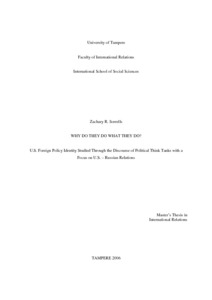Why do they do what they do? : U.S. Foreign Policy Identity Studied Through the Discourse of Political Think Tanks, with a Focus on U.S. Russian Relations
SORRELLS, ZACHARY (2006)
SORRELLS, ZACHARY
2006
Kansainvälinen politiikka/ISSS - International Relations/ISSS
Yhteiskuntatieteellinen tiedekunta - Faculty of Social Sciences
This publication is copyrighted. You may download, display and print it for Your own personal use. Commercial use is prohibited.
Hyväksymispäivämäärä
2006-12-04
Julkaisun pysyvä osoite on
https://urn.fi/urn:nbn:fi:uta-1-16309
https://urn.fi/urn:nbn:fi:uta-1-16309
Tiivistelmä
This thesis analyses the discourse of a set of major influential political think tanks in the U.S. in order to better understand the foreign policy identity of the United States. The research focuses on U.S. Russian relations, but the findings and methodology applied here could be applied in other areas regarding U.S. foreign policy.
The research leverages a theoretical construct based in the works related to Noam Chomsky and Edward Herman’s Propaganda Model and a strategy to understand identity construction presented by Abdelal, Rawi and Herrera, Johnston and McDermott. This strategy takes a close look at the different types of content in the discourse and the degree of contestation over this content. This helps us understand how firm or in flux the current identity is.
The methodological approach applied is mainly a version of critical discourse analysis. The result is a presentation of the key issues prevalent in the current discourse regarding U.S. Russian relations, a snapshot of the current U.S. foreign policy identity, and the implications of this identity for future developments in the U.S. Russian relationship.
The research leverages a theoretical construct based in the works related to Noam Chomsky and Edward Herman’s Propaganda Model and a strategy to understand identity construction presented by Abdelal, Rawi and Herrera, Johnston and McDermott. This strategy takes a close look at the different types of content in the discourse and the degree of contestation over this content. This helps us understand how firm or in flux the current identity is.
The methodological approach applied is mainly a version of critical discourse analysis. The result is a presentation of the key issues prevalent in the current discourse regarding U.S. Russian relations, a snapshot of the current U.S. foreign policy identity, and the implications of this identity for future developments in the U.S. Russian relationship.
